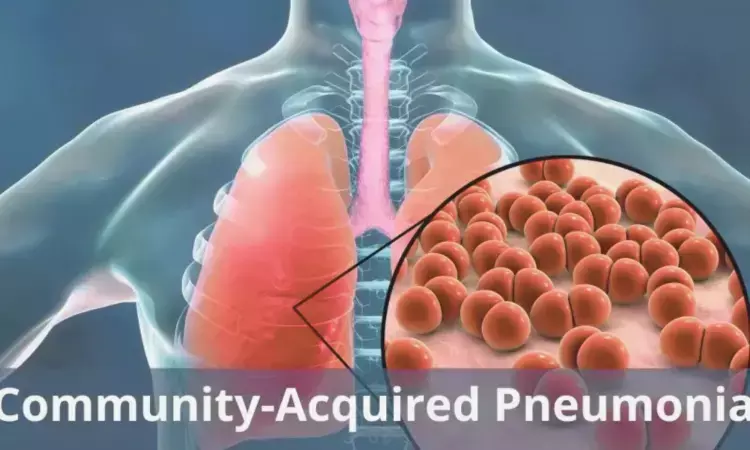- Home
- Medical news & Guidelines
- Anesthesiology
- Cardiology and CTVS
- Critical Care
- Dentistry
- Dermatology
- Diabetes and Endocrinology
- ENT
- Gastroenterology
- Medicine
- Nephrology
- Neurology
- Obstretics-Gynaecology
- Oncology
- Ophthalmology
- Orthopaedics
- Pediatrics-Neonatology
- Psychiatry
- Pulmonology
- Radiology
- Surgery
- Urology
- Laboratory Medicine
- Diet
- Nursing
- Paramedical
- Physiotherapy
- Health news
- Fact Check
- Bone Health Fact Check
- Brain Health Fact Check
- Cancer Related Fact Check
- Child Care Fact Check
- Dental and oral health fact check
- Diabetes and metabolic health fact check
- Diet and Nutrition Fact Check
- Eye and ENT Care Fact Check
- Fitness fact check
- Gut health fact check
- Heart health fact check
- Kidney health fact check
- Medical education fact check
- Men's health fact check
- Respiratory fact check
- Skin and hair care fact check
- Vaccine and Immunization fact check
- Women's health fact check
- AYUSH
- State News
- Andaman and Nicobar Islands
- Andhra Pradesh
- Arunachal Pradesh
- Assam
- Bihar
- Chandigarh
- Chattisgarh
- Dadra and Nagar Haveli
- Daman and Diu
- Delhi
- Goa
- Gujarat
- Haryana
- Himachal Pradesh
- Jammu & Kashmir
- Jharkhand
- Karnataka
- Kerala
- Ladakh
- Lakshadweep
- Madhya Pradesh
- Maharashtra
- Manipur
- Meghalaya
- Mizoram
- Nagaland
- Odisha
- Puducherry
- Punjab
- Rajasthan
- Sikkim
- Tamil Nadu
- Telangana
- Tripura
- Uttar Pradesh
- Uttrakhand
- West Bengal
- Medical Education
- Industry
Findings Call for Caution: Broad-Spectrum Antibiotics Raise ADE Risks in Outpatient Pneumonia Patients

USA: Recent research published in Clinical Infectious Diseases has illuminated the safety of various antibiotic regimens for treating community-acquired pneumonia (CAP) in otherwise healthy adults receiving outpatient care.
Findings indicate that broad-spectrum antibiotics, while effective against a wide range of pathogens, were linked to a higher incidence of adverse drug events (ADEs) in patients treated for CAP. Based on the findings, the researchers emphasize the importance of antimicrobial stewardship to encourage the careful use of broad-spectrum antibiotics, aiming to reduce antibiotic-related ADEs.
Community-acquired pneumonia is a common infection often managed in outpatient settings and typically affects otherwise healthy individuals. Current evidence on the comparative safety of antibiotic regimens for treating CAP remains limited, especially amid growing concerns about antibiotic resistance and the varying safety profiles of different treatments. To fill this knowledge gap, Anne M Butler, Washington University School of Medicine, St. Louis, MO, USA, and colleagues assessed the risk of adverse drug events linked to antibiotic regimens used for treating community-acquired pneumonia in otherwise healthy, non-elderly adults.
For this purpose, the researchers conducted an active comparator new-user cohort study from 2007 to 2019, focusing on commercially insured adults aged 18 to 64 diagnosed with outpatient CAP confirmed by chest X-ray and prescribed a same-day CAP-related oral antibiotic regimen. The follow-up duration for ADEs varied from 2 to 90 days, with specific conditions such as renal failure monitored over 14 days. They estimated risk differences per 100 treatment episodes and risk ratios using propensity score-weighted Kaplan-Meier functions and also included ankle/knee sprains and influenza vaccination as negative control outcomes.
Key Findings of the Study
- Among 145,137 otherwise healthy patients with community-acquired pneumonia and no comorbidities:• 52% received narrow-spectrum regimens:• 44% were prescribed macrolides• 8% received doxycycline• 48% received broad-spectrum regimens:• 39% were prescribed fluoroquinolones• 7% received β-lactams• 3% received a combination of β-lactam and macrolide• Compared to macrolide monotherapy, broad-spectrum antibiotic regimens were associated with an increased risk of several adverse drug events:• β-lactam regimen:• Nausea/vomiting/abdominal pain: Risk difference (RD) per 100 = 0.32• Non-Clostridioides difficile diarrhea: RD per 100 = 0.46• Vulvovaginal candidiasis/vaginitis: RD per 100 = 0.36• Narrow-spectrum antibiotic regimens largely exhibited similar risk profiles for ADEs.• The negative control outcome analysis showed similar risks, indicating minimal confounding.
The authors state that the study's results contribute to growing evidence indicating that transitioning prescribing practices from broad-spectrum to narrower-spectrum antibiotics could help prevent adverse drug events (ADEs).
They noted, "Ultimately, understanding antibiotic-related harms can empower patients, prescribers, and stewardship programs to make informed decisions regarding antibiotic use."
Reference:
Butler, A. M., Nickel, K. B., Olsen, M. A., Sahrmann, J. M., Colvin, R., Neuner, E., A, C., Fraser, V. J., Durkin, M. J., & Epicenters Program, C. P. Comparative safety of different antibiotic regimens for the treatment of outpatient community-acquired pneumonia among otherwise healthy adults. Clinical Infectious Diseases. https://doi.org/10.1093/cid/ciae519
Dr Kamal Kant Kohli-MBBS, DTCD- a chest specialist with more than 30 years of practice and a flair for writing clinical articles, Dr Kamal Kant Kohli joined Medical Dialogues as a Chief Editor of Medical News. Besides writing articles, as an editor, he proofreads and verifies all the medical content published on Medical Dialogues including those coming from journals, studies,medical conferences,guidelines etc. Email: drkohli@medicaldialogues.in. Contact no. 011-43720751


